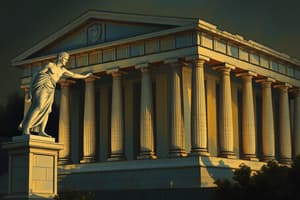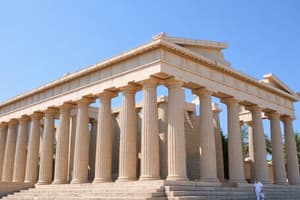Podcast
Questions and Answers
Quelle est la définition d'une cité-état dans la Grèce antique?
Quelle est la définition d'une cité-état dans la Grèce antique?
Un petit pays indépendant.
Qu'est-ce qui unissait les Grecs de l'Antiquité?
Qu'est-ce qui unissait les Grecs de l'Antiquité?
Une civilisation commune : mêmes mœurs, langue, religion, sang.
Pourquoi les Grecs de l'Antiquité étaient-ils souvent désunis?
Pourquoi les Grecs de l'Antiquité étaient-ils souvent désunis?
À cause des rivalités entre cités-états et des difficultés de communication dues au relief.
Quelle était l'attitude des Grecs vis-à-vis des peuples étrangers?
Quelle était l'attitude des Grecs vis-à-vis des peuples étrangers?
Quel était le rôle principal des Jeux Olympiques dans la Grèce antique?
Quel était le rôle principal des Jeux Olympiques dans la Grèce antique?
Quelles étaient les causes principales de la colonisation grecque?
Quelles étaient les causes principales de la colonisation grecque?
Quelle éducation était dispensée aux jeunes Athéniens?
Quelle éducation était dispensée aux jeunes Athéniens?
Quels étaient les régimes politiques en vigueur à Athènes et à Sparte?
Quels étaient les régimes politiques en vigueur à Athènes et à Sparte?
Qui était Périclès et pourquoi était-il célèbre?
Qui était Périclès et pourquoi était-il célèbre?
Quelles sont deux limites de la démocratie athénienne?
Quelles sont deux limites de la démocratie athénienne?
Quels sont les aspects principaux de l'institution de l'Ekklesia?
Quels sont les aspects principaux de l'institution de l'Ekklesia?
Comment la démocratie athénienne diffère-t-elle d'une démocratie moderne, comme celle de la Belgique?
Comment la démocratie athénienne diffère-t-elle d'une démocratie moderne, comme celle de la Belgique?
Quelles sont les grandes qualités de l'art grec?
Quelles sont les grandes qualités de l'art grec?
Quels sont les différents ordres d'architecture grecque?
Quels sont les différents ordres d'architecture grecque?
Décrivez la sculpture grecque de la période archaïque.
Décrivez la sculpture grecque de la période archaïque.
Quelle période de la sculpture grecque met en avant le mouvement et la nudité?
Quelle période de la sculpture grecque met en avant le mouvement et la nudité?
Comment la peinture grecque évolue-t-elle entre le VIe et le Ve siècle av J-C?
Comment la peinture grecque évolue-t-elle entre le VIe et le Ve siècle av J-C?
Citez un grand historien grec et ses idées.
Citez un grand historien grec et ses idées.
Quels titres étaient attribués aux empereurs romains pour montrer leur pouvoir et leur statut?
Quels titres étaient attribués aux empereurs romains pour montrer leur pouvoir et leur statut?
Comment Auguste a-t-il contribué à la stabilité et à la grandeur de Rome?
Comment Auguste a-t-il contribué à la stabilité et à la grandeur de Rome?
Pourquoi l'unité de l'Empire romain a-t-elle été maintenue malgré sa division en deux parties?
Pourquoi l'unité de l'Empire romain a-t-elle été maintenue malgré sa division en deux parties?
Quelles étaient les répercussions de l'afflux de luxe et d'esclaves sur la société romaine?
Quelles étaient les répercussions de l'afflux de luxe et d'esclaves sur la société romaine?
Quels problèmes ont surgi du fait que l'Empire romain est devenu trop grand?
Quels problèmes ont surgi du fait que l'Empire romain est devenu trop grand?
Quel était le principal objectif des conquêtes romaines ?
Quel était le principal objectif des conquêtes romaines ?
Pourquoi les Romains voulaient-ils contrôler le commerce en Méditerranée ?
Pourquoi les Romains voulaient-ils contrôler le commerce en Méditerranée ?
Quels éléments naturels défendaient l'Empire romain au nord ?
Quels éléments naturels défendaient l'Empire romain au nord ?
Comment pouvait-on devenir magistrat à Rome ?
Comment pouvait-on devenir magistrat à Rome ?
Quel territoire modern actuel faisaient partie de l'Empire romain ? Nommer trois pays.
Quel territoire modern actuel faisaient partie de l'Empire romain ? Nommer trois pays.
Flashcards
Greek Architecture
Greek Architecture
The architectural style of ancient Greece, characterized by its emphasis on geometry, symmetry, straight lines, and simplicity.
Doric Order
Doric Order
A type of ancient Greek architecture characterized by simple, rectangular capitals (the top portion of a column).
Ionic Order
Ionic Order
A type of ancient Greek architecture characterized by capitals with volutes (spiral-shaped ornaments).
Corinthian Order
Corinthian Order
Signup and view all the flashcards
Archaic Greek Sculpture
Archaic Greek Sculpture
Signup and view all the flashcards
Classical Greek Sculpture
Classical Greek Sculpture
Signup and view all the flashcards
Hellenistic Greek Sculpture
Hellenistic Greek Sculpture
Signup and view all the flashcards
Archaic Greek Painting
Archaic Greek Painting
Signup and view all the flashcards
Black-Figure Vase Painting
Black-Figure Vase Painting
Signup and view all the flashcards
Red-Figure Vase Painting
Red-Figure Vase Painting
Signup and view all the flashcards
Greek Polis
Greek Polis
Signup and view all the flashcards
Greek Civilization
Greek Civilization
Signup and view all the flashcards
Olympic Games
Olympic Games
Signup and view all the flashcards
Olympic Oath
Olympic Oath
Signup and view all the flashcards
Nudity in the Olympics
Nudity in the Olympics
Signup and view all the flashcards
Free Greek Men in the Olympics
Free Greek Men in the Olympics
Signup and view all the flashcards
Greek Colonization
Greek Colonization
Signup and view all the flashcards
Causes of Greek Colonization
Causes of Greek Colonization
Signup and view all the flashcards
Consequences of Greek Colonization
Consequences of Greek Colonization
Signup and view all the flashcards
Acropolis
Acropolis
Signup and view all the flashcards
Temple of Athena
Temple of Athena
Signup and view all the flashcards
Heliaia
Heliaia
Signup and view all the flashcards
Agora
Agora
Signup and view all the flashcards
Strategion
Strategion
Signup and view all the flashcards
Pnyx
Pnyx
Signup and view all the flashcards
Athenian Democracy
Athenian Democracy
Signup and view all the flashcards
Ekklesia
Ekklesia
Signup and view all the flashcards
Boule
Boule
Signup and view all the flashcards
Heliaia
Heliaia
Signup and view all the flashcards
Strategos
Strategos
Signup and view all the flashcards
Pericles
Pericles
Signup and view all the flashcards
Limits of Athenian Democracy
Limits of Athenian Democracy
Signup and view all the flashcards
Ostracism
Ostracism
Signup and view all the flashcards
Study Notes
L'Art Grec
- La géométrie, la symétrie, la ligne droite et la simplicité sont des qualités de l'art grec.
- Les trois ordres d'architecture grecs sont :
- Dorique : chapiteau simple, rectangulaire
- Ionique : chapiteau avec volutes
- Corinthien : chapiteau décoré de feuillages
- La sculpture grecque passe par trois périodes :
- Archaïque : figée, décors géométrique et stylisé, mal proportionnée
- Classique : mouvement, bien proportionnée, nudité
- Hellénistique : exagération des mouvements, émotions, proportion parfaite
- La peinture grecque connaît également trois périodes :
- Archaïque (VIIe siècle av. J-C.) : peu de place au vide, décors stylisés et géométriques
- Figure noire à fond rouge (VIe siècle av. J-C.) : figure noire à fond rouge, peu précis, et détaillé
- Figure rouge à fond noire (Ve siècle av. J-C.) : figure rouge à fond noire, + précis et détaillé
La Grèce
- La cité-état est comme un petit pays indépendant.
- Les Grecs de l'Antiquité sont unis par une civilisation commune : même mœurs, langue, religion, sang.
- Les Grecs de l'Antiquité sont souvent rivaux et cherchent à s'imposer aux autres par la guerre.
Les Jeux Olympiques
- Les Jeux Olympiques sont une cérémonie religieuse et funéraire.
- Les Grecs pratiquent le serment, sont nus, et sont des Grecs libres.
La Colonisation
- Les Grecs colonisent à cause de la famine, du manque de place, du commerce, des conflits et du droit d'aînesse.
- Ils s'installent autour du bassin méditerranéen.
- Les conséquences de la colonisation sont que les Grecs deviennent les principaux marchands dans le bassin méditerranéen en concurrence avec les Phéniciens.
Athènes
- La ville est composée de plusieurs parties : l'Acropole, le Temple, l'Héliée, l'Agora, le Stratègeion et le Pnyx.
- L'éducation à Athènes est militaire ou stricte.
- Le système politique d'Athènes est la démocratie.
- Les institutions d'Athènes sont :
- L'Ekklesia : assemblée des citoyens qui vote les lois
- La Boule : prépare les lois, sélectionnés par tirage au sort pour un an
- L'Ellie : Tribunal, également sélectionné par tirage au sort
- Le Stratège : Commandant de l'armée, gère la ville, élu parmi les meilleurs candidats pour un an
Périclès
- Périclès est un général athénien noble, intelligent et honnête.
Les Limites de la Démocratie Athénienne
- Seuls les citoyens peuvent participer à la vie politique.
- Les femmes, les étrangers et les esclaves sont exclus de la vie politique.
- L'ostracisme est l'exil pendant dix ans après un vote.
Comparaison avec la Démocratie Moderne
- La démocratie moderne impose le vote obligatoire (comme en Belgique).
- Les femmes ont le droit de vote.
- Les étrangers peuvent voter dans certaines circonstances.
L'Empire Romain
- Les titres de l'empereur sont :
- Auguste : le divin
- Imperator : général victorieux, empereur
- Caesar : titre donné aux empereurs romains
- Princeps : premier citoyen
- Pontifex Maximus : le grand Pontife
- Auguste administre Rome en mettant fin aux guerres civiles, en réalisant de grands travaux pour embellir Rome, en protégeant les arts et les lettres.
- L'unité de l'empire est maintenue car il est divisé en deux parties : l'Orient et l'Occident, chacune ayant un dirigeant.
- Les conséquences des conquêtes romaines sont l'afflux de luxe et d'esclaves, la paresse des Romains, la taille trop grande de l'empire et la dépendance de Rome envers ses provinces.
Studying That Suits You
Use AI to generate personalized quizzes and flashcards to suit your learning preferences.
Description
Découvrez les caractéristiques de l'art grec, notamment la géométrie, la symétrie et les trois ordres d'architecture. Explorez également les trois périodes de la sculpture grecque.




